|
|
|
Sort Order |
|
|
|
Items / Page
|
|
|
|
|
|
|
| Srl | Item |
| 1 |
ID:
103767
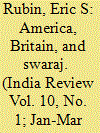

|
|
|
|
|
| Publication |
2011.
|
| Summary/Abstract |
In the years before and during the Second World War, the Roosevelt Administration played an important and often overlooked role in encouraging Britain's disengagement from the Indian subcontinent. Roosevelt's motivations in pressing for Indian independence were varied. They included a mix of principled opposition to colonialism, practical concern for the outcome of the war and pragmatic jockeying for influence with post-colonial nations when the war was won. Churchill's government was wary of being pushed by Washington to move more quickly to "quit India" than it thought prudent. U.S. policy and actions clearly influenced the direction of events toward independence, but U.S. caution as the war ground on led to disillusionment among nationalist leaders. This reaction would have consequences once swaraj was won and India came into its own, at a time when the Cold War was becoming the dominant factor in America's view of the world.
|
|
|
|
|
|
|
|
|
|
|
|
|
|
|
|
| 2 |
ID:
114169
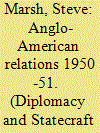

|
|
|
|
|
| Publication |
2012.
|
| Summary/Abstract |
In 1949-1950, Britain rejected ideas of being a third force between the post-war Superpowers and adopted instead an approach that has been the keystone of British foreign policy from that point onwards: "hugging America close." The aspiration was to establish a position closely related to the United States yet sufficiently independent, effectively to harness American power to British ends. This now familiar position has been much-debated recently in the context of post-9/11 military interventions in Iraq and Afghanistan especially. However, this analysis examines three crises immediately following the British decision in 1949-1950 to give priority to the Anglo-American "special relationship" to demonstrate that, for Britain, this policy from the onset was both advantageous and potentially difficult. The outcomes of crises over NATO's Atlantic Command, Iranian oil, and ANZUS demonstrate how expansion of United States influence benefitted Britain but sometimes also required painful British adjustment and loss of prestige.
|
|
|
|
|
|
|
|
|
|
|
|
|
|
|
|
| 3 |
ID:
032356
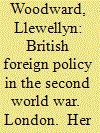

|
|
|
|
|
| Publication |
London, Her Majesty's Stationery Office, 1962.
|
| Description |
lvi, 596p.Hbk
|
| Series |
History of the Second World War
|
|
|
|
|
|
|
|
|
|
|
|
Copies: C:1/I:0,R:0,Q:0
Circulation
| Accession# | Call# | Current Location | Status | Policy | Location |
| 010870 | 940.54/WOO 010870 | Main | On Shelf | General | |
|
|
|
|
| 4 |
ID:
034915


|
|
|
|
|
| Publication |
London, Her Majesty's Stationery Office, 1970.
|
| Description |
lx, 640p.Hbk
|
| Series |
History of Second World War
|
| Contents |
Vol. I.
|
| Standard Number |
116300523
|
|
|
|
|
|
|
|
|
|
|
|
Copies: C:1/I:0,R:0,Q:0
Circulation
| Accession# | Call# | Current Location | Status | Policy | Location |
| 007653 | 940.532452/WOO 007653 | Main | On Shelf | General | |
|
|
|
|
| 5 |
ID:
120480
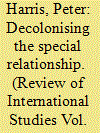

|
|
|
|
|
| Publication |
2013.
|
| Summary/Abstract |
In this article, I challenge the prevailing concept of the UK-US 'special relationship' with a view to improving the concept as an analytic tool for researchers. As it stands, the special relationship draws attention to an uncommonly close bond between two state actors in the post-Second World War period, especially in terms of military cooperation. This conception imposes analytic costs - namely, an elision of imperialism as a feature of Anglo-American relations and a concomitant marginalisation of subaltern social actors. In response, I propose a reconception that posits the subaltern - third parties - as integral to the relationship, thus better capturing the empirical reality of Anglo-American relations past and present. Theoretically, I draw upon postcolonial International Relations scholarship and recent theories of friendship in international politics. Empirically, I present a case study of the US military base on Diego Garcia in the Chagos Islands.
|
|
|
|
|
|
|
|
|
|
|
|
|
|
|
|
| 6 |
ID:
114690


|
|
|
|
|
| Publication |
2012.
|
| Summary/Abstract |
Adopting the analytical framework of the established interpretive "schools" of Anglo-American relations, this article offers several reflections on UK-US defense relations as they occurred over the significant years of 2000-2005. During those years, trajectories were established on which UK-US defense relations continue to travel today and outcomes emerged which are still being navigated. This article concludes that the Latin phrase, "Flectas Non Frangas" (essentially translated as: "Bend not Break"), is the most appropriate to adopt to characterize the developments undergone in recent UK-US defense relations. Many historical and strategic lessons with contemporary relevance are drawn.
|
|
|
|
|
|
|
|
|
|
|
|
|
|
|
|
| 7 |
ID:
120426
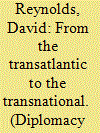

|
|
|
|
|
| Publication |
2013.
|
| Summary/Abstract |
The first of Kathleen Burk's many books, based on her Oxford D. Phil. dissertation, was Britain, America and the Sinews of War, 1914-1918 (1985). This explored a hitherto neglected aspect of the Great War when Britain became dependent on American supplies and finance to maintain its war effort. By the autumn of 1916 two million pounds of the five million needed every day by the British Treasury in order to prosecute the war came from the United States. "If things go on as at present," the Chancellor of the Exchequer warned, "I venture to say with certainty that by next June or earlier the President of the American Republic will be in a position, if he wishes, to dictate his own terms to us." The situation did improve somewhat after the United States entered the war in April 1917, but Britain's underlying dependence remained. The war had mobilised America as a global financial power, whilst also permanently sapping Britain's economic strength. In retrospect the period can be seen as a turning point in Anglo-American relations and, indeed, in global history.
|
|
|
|
|
|
|
|
|
|
|
|
|
|
|
|
| 8 |
ID:
099986
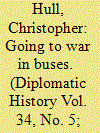

|
|
|
|
|
| Publication |
2010.
|
| Summary/Abstract |
The sale of buses by the Leyland Motor Company to Cuba proved contentious, not only in the realm of Anglo-American relations, but also in the domestic sphere of a behind the scenes inter-departmental disagreement within the British government. This is because the bus exports pitted political against economic interests at the height of the Cold War and in the midst of a British export drive. As Her Majesty's Government readily recognized, Washington was particularly sensitive over any issue related to Cuba, which by 1963 was firmly in the communist orbit of the Soviet bloc and which the United States was determined to isolate economically through the application of a trade blockade.
The decision to approve the sales came at the end of the Macmillan and Kennedy administrations, and clouded the short-lived partnership of Prime Minister Alec Douglas-Home and President Lyndon B. Johnson. The bus exports became an election issue in the campaigns of both leaders in 1964, assuming a political significance that belied the buses' seemingly innocuous function and outward appearance.
|
|
|
|
|
|
|
|
|
|
|
|
|
|
|
|
| 9 |
ID:
067347
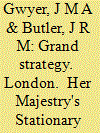

|
|
|
|
|
| Publication |
London, Her Majestry's Stationary Office, 1964.
|
| Description |
xv, 401p.Hbk
|
| Series |
United Kingdom Military Series
|
| Contents |
Vol.III: June 1941-August 1942
|
|
|
|
|
|
|
|
|
|
|
|
Copies: C:1/I:0,R:0,Q:0
Circulation
| Accession# | Call# | Current Location | Status | Policy | Location |
| 009221 | 940.53/GWY 009221 | Main | On Shelf | General | |
|
|
|
|
| 10 |
ID:
105214


|
|
|
|
|
| Publication |
2011.
|
| Summary/Abstract |
Herbert Hoover is often portrayed as a business-centric relatively non-political historical figure. In particular during his time as Commerce Secretary in the administrations of Warren Harding and Calvin Coolidge, Hoover is often described as supporting a United States foreign policy that first and foremost served the needs of American corporations. This article attempts to recalibrate that picture by stressing Hoover's political self-interest as a motivating factor in his policies. Far from being politically unconcerned, Hoover was a man desperate to become president of the United States. His disastrous campaign for the Republican nomination in 1920 made him doubly determined to use his power in the Republican cabinets to improve his chances for the nomination later. This can be seen in one of the most famous of Hoover's foreign policy interventions, the Anglo-American rubber crisis. Far from serving the needs of American business, during this crisis Hoover was acting mostly from political self-interest. In particular attacking the British allowed him to reframe his image, which was seen as Anglophiliac in 1920. In the end it was a very successful rebranding, as Hoover was able to run for the presidency in 1928 from a position of strength when it came to foreign affairs.
|
|
|
|
|
|
|
|
|
|
|
|
|
|
|
|
| 11 |
ID:
095528
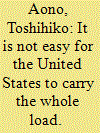

|
|
|
|
|
| Publication |
2010.
|
| Summary/Abstract |
This article reexamines Anglo-American relations in light of the Berlin crisis during the Kennedy years. The Berlin crisis has been extensively studied, especially after the 1990s when newly declassified materials shed new light on the incident. Using archival sources of the former Soviet bloc countries, recent works have closely explored Khrushchev's motivation for provoking such a conflict in Central Europe, while revealing the dynamics of alliance politics between the Soviet Union and the German Democratic Republic (GDR).1 On the Western side, while focusing mainly on American and West German decision making, many studies point out that the major Western powers-the United States, Britain, France, and the Federal Republic of Germany (FRG)-disagreed on how to handle the Berlin crisis.
|
|
|
|
|
|
|
|
|
|
|
|
|
|
|
|
| 12 |
ID:
124184


|
|
|
|
|
| Publication |
2013.
|
| Summary/Abstract |
Between 1913 and 1917, Colonel Edward House, President Woodrow Wilson's closest friend and advisor, undertook several missions to Europe. Serving to shape House's attitude to American neutrality, House's advice deriving from these trips was extremely influential upon Wilson's foreign policy. This analysis examines the influences on House's advice, arguing that his pro-Allied stance evolved during this time and influenced Wilson's ultimate decision to have the United States enter the war on the Allied side. The primary influence on House's attitude was his relationship with British foreign secretary, Sir Edward Grey. Several factors drew the two men together. They meshed with House's pre-existing views on global geopolitics expressed in his novel, Philip Dru. Previous scholarship that has investigated House's trips to Europe tends to gloss over the intricacies of the House-Grey relationship. Whilst the two men shared a close friendship, examination of their correspondence and the observation of others suggests that Grey's diplomatic goal was to establish close Anglo-American relations, and that a close connexion with House furthered that aim. This connexion re-enforced House's pro-Allied attitude that, in turn, contributed to America's entrance into the war.
|
|
|
|
|
|
|
|
|
|
|
|
|
|
|
|
|
|
|
|
|